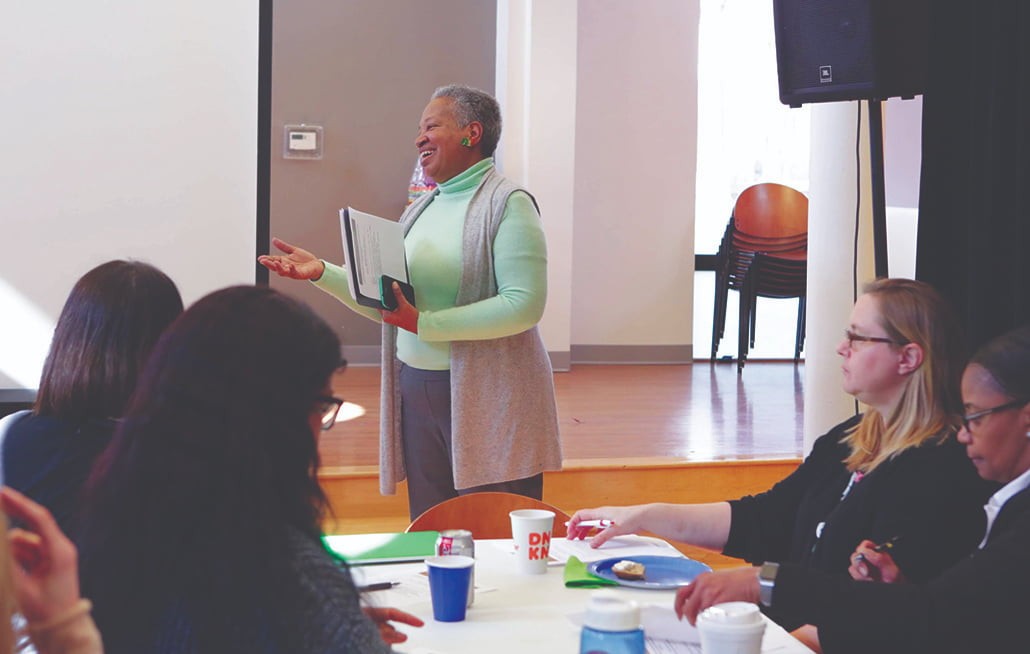The Corcoran Center for Real Estate and Urban Action has been building partnerships in Boston’s Mattapan neighborhood for more than a year. Rather than imposing a preconceived program, Corcoran Center Director Neil McCullagh is asking residents what Boston College can do to help.
Those efforts took another step in March, when representatives from neighborhood schools, non-profit groups, and community-based organizations met at the Mattapan Teen Center with representatives from the Connell School of Nursing, Lynch School of Education and Human Development, and BC School of Social Work.
The school representatives discussed the work faculty can do, as well as student volunteers and students in clinical placements required to graduate or earn professional certifications. Lynch School Director of Practicum Partnerships and Professional Development Christine Power told the gathering that Lynch School students are available for clinical placements as they prepare for careers as teachers, counselors and educational psychologists. Many undergraduates can volunteer for several hours a week. Students seeking professional licensure can fill placements that provided many more hours of learning and service time, she added.

Corcoran Center for Real Estate and Urban Action Community Engagement Coordinator Vivien Morris spoke at a recent meeting of Boston College administrators and Mattapan community representatives. Photo by Ed Hayward.
McCullagh says he wants to hear directly from neighborhood residents, businesses, non-profits, and schools about the types of support they need, rather than offer a one-size-fits-all approach to service in the neighborhood.
“We’re not coming at this from the perspective that one great strike can change everything, but rather that a number of small projects developed with input from the community can make a difference.”
The project started last year, led by the Corcoran Center’s Community Engagement Coordinator Vivien Morris, who established an advisory council to help steer the Carroll School of Management-based center’s outreach to the neighborhood on Boston’s southern boundary, where BC has not traditionally had a large presence.
In a little more than a year, the Corcoran Center has enabled new service and outreach that regularly brings about 50 students from academic and service learning into the neighborhood, along with four full-time summer interns, says Taylor Perkins, assistant director of the Corcoran Center. In addition, there are 24 BC students in the Big Brother Big Sister program working with 24 students in neighborhood schools, says Kate Daly, associate director of the Volunteer and Service Learning Center, who also attended the meeting.
“ We’re not coming at this from the perspective that one great strike can change everything, but rather that a number of small projects developed with input from the community can make a difference. ”
Dorchester/Mattapan Liaison Roudnie Celestin, of the city’s Office of Neighborhood Services, attended the event and says Boston Mayor Marty Walsh wants to see Mattapan receive the support it needs to thrive at all levels.
“I love to see people bringing energy and commitment into the community by sharing their expertise,” says Celestin. “Mattapan feels like it is playing catch-up in terms of its growth and development and the mayor is eager to see Mattapan grow and see opportunity flourish here now and in the future. This meeting is a great start and I look forward to seeing these efforts progress.”
Morris is a 30-year resident of Mattapan and a leader of the local organization Mattapan Food and Fitness Coalition, which focuses on healthy eating and lifestyle issues. She says it is critical to take input from residents and other stakeholders.
“We are building trust that will strengthen ties between Mattapan and BC and connecting resources of BC to priority issues in the community that are under-resourced,” says Morris.
The neighborhood, which surrounds Mattapan Square on Blue Hill Avenue, is home to predominantly African American and low-income residents, says Morris. There are many immigrant families as well.
“This is another step in an ongoing process that we started last year to have the Mattapan community clarify issues that are important to them and to connect them with the resources available through the University and its programs,” says Morris. “Today, we’re finding new thinking and new projects and building on the relationships that have started to form.”
Miatta Kangee, a school psychologist at the Young Achievers K-8 School, located in Mattapan, says she was impressed by the possible collaboration with the Lynch School.
“This is phenomenal and really helpful,” Kangee says. “There are things that we need that the University could provide. That was great. I wasn’t expecting that.”
Sharon Callender, the director of Family & Community Health Services at the Mattapan Community Health Center, says she was glad the Corcoran Center and other BC staffers came to the neighborhood to ask questions.
“It is of the utmost importance,” says Callender. “I’m a nurse, a specialist in public health and when you look at issues from a public health perspective, someone may have all the good intentions and that can backfire if you don’t go in and ask people in the community first: ‘Do you want our help?’ and then, ‘What can we do to help?’”
McCullagh agrees.
“We have made every effort to be led by community-identified needs and interests,” he says. “In the coming weeks and months, we will be following up on the efforts today and we will be coordinating with partners to ensure that student programming for next year is responsive to the community and builds mutually beneficial relationships.”
—Ed Hayward | University Communications | April 2019



